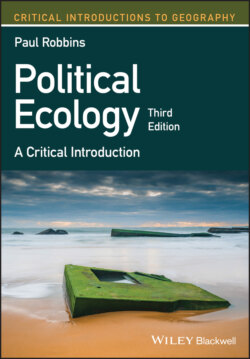Читать книгу Political Ecology - Paul Robbins - Страница 13
The Goals of the Text
ОглавлениеIt would be impossible to survey the field of political ecology in its entirety. The contributors are too many, the breadth of topics too vast, and the regional diversity too great. I do not, therefore, intend here to provide exhaustive case studies of political ecological research (see especially Peet and Watts 1996a; Peet, Robbins, and Watts 2010; Bridge, McCarthy, and Perreault 2015b) or a general account of the relationship between science and politics (Forsyth 2003), since this is a task well performed by others. Neither can I place this field and approach within the longer history of geographic science in more than a cursory way, though there are other excellent sources for this (Castree 2005, 2011), nor do I intend to survey the world system as a whole, pointing to the processes, players, and dynamics that are at work politicizing the natural environment. Many excellent books survey the condition of global debt, the position of local producers in commodity markets, and the dwindling power of the state in managing nature (Bryant and Bailey 1997; Sheppard et al. 2009).
Rather, I intend to do something different here. Whereas most summary texts on the state of global political ecology are designed to show political ecology as a body of knowledge, this book is designed also to show political ecology as something people do. And whereas collected volumes highlight a number of separate and distinct cases, this book also gropes for common questions that underlie them. Finally, where some work highlights the field as a specific approach, I suggest instead that it constitutes a community of practice and characterizes a certain kind of text, albeit an extremely valuable one.
The book is also designed to serve as an introduction and companion volume to the key books, articles, arguments, and research statements that make up the core of the field, and should serve to introduce any interested party to its major works and contested ideas. In this regard, it is offered as a remedy for the purported problem that the field is so fragmented that citation in it, as senior political ecologist Piers Blaikie once remarked, “is largely a random affair.”
But more than this, the book is a critical review of the work that goes on in the field, one that advocates a very particular vision of which approaches work and which do not and which lines of inquiry have the most political and analytic power and which do not. In the process, I further hope that the book reveals areas where the field might yet improve its analytical tools. I hope to show, notably, that political ecological analysis and argument have shifted from a focus on the destruction of environments, with a stress on human influences, to a more powerful focus on the production of socio‐environments and their co‐constitution by many kinds of human and non‐human actors. Even so, the book will suggest that there may and must be ways to move “beyond” political ecology or to leverage political ecological texts to better effect. Even while showing the strength of the approach, therefore, the book is written to demonstrate weaknesses, while pointing the way forward towards a more coherent and simultaneously more critical way of doing research.
I will not provide and rehearse, however, the laundry list of more typically pronounced criticisms often made of the field – usually centered on the fact that it is too focused on the broadly defined “underdeveloped world,” that it is too “rural” in character, and that it lacks commitment to scientific ecology. These claims are true, but such biases, as discussed here, grow quite inevitably from the professional and intellectual seeds from which the tree of political ecology sprouted – critical development research, peasant studies, environmental history, cultural ecology, and postcolonial theory. We have already seen in the past few years how political ecology has become more symmetrically concerned with the traditionally defined “first world” and urban areas and issues. We have also seen an unprecedented set of partnership emerge, within political ecology (and its sibling: critical physical geography) towards taking environmental systems and science seriously. These changes have not guaranteed, however, that political ecology approaches have become more coherent, or that the use of either ecological science or critical deconstruction has been managed with greater rigor. These explanatory problems, I argue, are prior to, and more important than, the specific topical and regional choices made in research.
